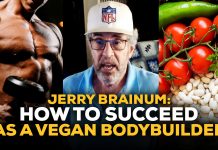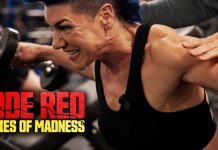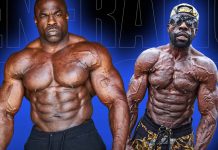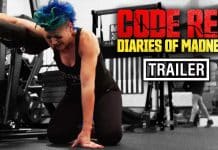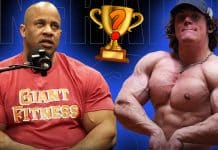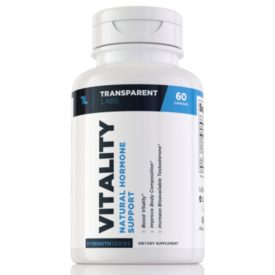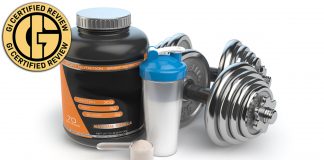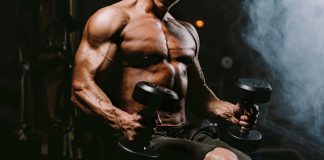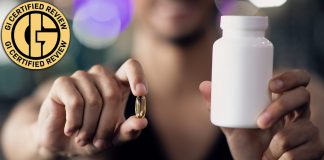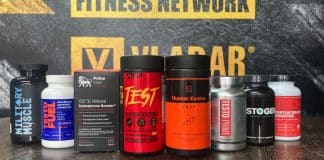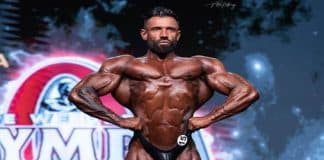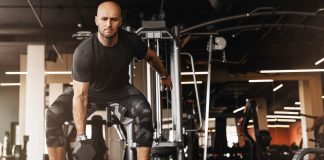Low testosterone levels can be a killer, but thankfully, the good doctor, Dr. Testosterone, has excellent tips for boosting T naturally.
For bodybuilders, increasing muscle mass, controlling body fat and weight management, and seeking to improve overall health are the keys to getting those goals to be a reality. One important to note when it comes to improving these goals is your production of natural testosterone and your body’s response to increasing it. Since testosterone is essential for both men’s and women’s health, those with low T will unfortunately feel the adverse effects that come along with this. Let’s review some natural ways to boost testosterone.
Dr. Testosterone sat down with Generation Iron to discuss low testosterone’s effects on bodybuilders and the best ways to naturally get those T levels to where you want them. He is one of a small selection of certified doctors whose mission is to improve the health and safety of bodybuilders. As someone who understands the laws and regulations surrounding steroid and PED use, he does his best to help bodybuilders understand the safest way to enhance their overall physique and performance while staying safe. In our GI exclusive interview, Dr. Testosterone describes the best ways to boost testosterone levels naturally, top foods to aid in this process, and what low T levels can do to the body.
Testosterone is a hormone produced by the body that affects a man’s physical appearance and sexual development. Testosterone aids in sperm production and sex drive, muscle growth, and bone development (1). While testosterone-boosting supplements can be great aids for those suffering from low T levels, knowing how to boost test levels naturally will provide healthier ways to get you back on track.
Best Ways To Boost Testosterone Naturally
Increasing your natural test levels involve many different aspects of changing certain facets of your lifestyle. Dr. Testosterone first talks about weight loss and management and that those who are overweight or obese tend to have difficulty keeping those levels high. Fat cells work against you to metabolize testosterone into estrogen and reduce levels of the sex hormone globulin, which carries testosterone in the blood (2). For this reason, those looking to preserve muscle while lowering their body fat percentage will allow the brain to produce testosterone better. In short, being leaner allows for better testosterone production.
Regarding overall lifestyle, Dr. Testosterone says that between 11 pm and 7 am is the best time for healing and recovery to maximize both T levels and overall performance. In terms of training, high-intensity interval training and resistance training with lactate reduction will benefit you (3). Performing 8-12 reps with high intensity is the goal, but not overdoing it is critical. Anything longer than 45 minutes will produce cortisol (the stress hormone), which has the unfortunate side effect of lowering testosterone.
Foods For Natural T Production
Bodybuilders take dieting very seriously, and knowing what to eat and when to eat is essential to seeing that growth. Regarding boosting natural testosterone, cholesterol is vital for testosterone synthesis. Those with too low cholesterol levels will find their T levels to be lower (4). Foods like egg yolks, red meat, leafy greens, avocados, and even ginger can all help raise your testosterone levels. Red meat is a great food to naturally boost T levels because it contains zinc, which is necessary to convert androstenedione, a naturally occurring steroid hormone, into testosterone.
Dr. Testosterone does point out that alcohol and medications like opiates and SSRIs are essential to avoid if you can, as well as marijuana. Alcohol, for example, can damage Leydig cells in the testes, which produce and secrete testosterone (5) and release endorphins. While endorphins provide a relaxed feeling, they can interfere with testosterone synthesis.
Other foods and substances to avoid are essential in your efforts to boost testosterone levels naturally. Soy products tend to have similar compounds to estrogen, which can act against testosterone if not treated with things like aromatase inhibitors (6). Some dairy products may also contain synthetic or natural hormones that affect T levels. If animal feed contains soy, you get the by-product of increased estrogen levels from that source. Processed foods contain high amounts of salt, sugar, and trans fats, impairing testicular function and reducing test levels.
Best Testosterone Boosting Supplement
While food is a massive factor in increasing testosterone, supplementation is something to consider. A significant testosterone boosting supplement, and one worth your time and money, will increase your testosterone levels to the right amount, assist with body composition goals by working to turn fat to muscle, improve your sex drive, enhance bone density, and better your cognitive function. Centrapeak can do this and much more and is a top choice compared to others on the market.
Transparent Labs Vitality is an innovative 3-in-1 natural test booster and hormone optimizing supplement. A powerful formula matched by amazing ingredients, this is perfect for overall vitality.
Transparent Labs Vitality is an innovative 3-in-1 natural hormone optimizing supplement that can work wonders for your overall health and performance goals. This supplement works to boost testosterone levels while controlling estrogen and cortisol production so those suffering from low testosterone never have to worry. With a powerful formula packed with amazing ingredients, this supplement sets the foundation for lean muscle gains, fat burning, strength, libido, confidence, and overall vitality to ensure your workouts, activities, and lifestyle are all enhanced. With no artificial sweeteners, coloring, or preservatives, you know Vitality is clean with proven and effective ingredients.
Vitality includes ingredients such as zinc, ashwagandha, DIM, bioperine, and boron, all of which aid in the testosterone boosting effects.
For more information check out our full review on Transparent Labs Vitality!
Testosterone Replacement Therapy
Testosterone replacement therapy, or TRT for short, is a form of testosterone enhancement. It is a therapy provided by a medical professional to increase your testosterone levels. TRT is a medical tool to help those who suffer from natural low tests. TRT, in essence, is only used to bring your body to normal levels of testosterone for your age. It is not used for performance enhancement; it’s perfectly legal and is often allowed by athletes in professional sports, as it is not classified as anabolic steroid usage.
Check out this video from our GI Podcast on TRT.
Is Your Testosterone Normal?
Testosterone is a hormone that plays a critical role in your strength training and overall bodybuilding. According to research, this hormone modulates muscle mass in both men and women. So, it’s normal to wonder if yours are normal.
Apart from its benefits, low testosterone levels can be detrimental. It can lead to muscle loss, a low sex drive, low energy, and even obesity. If you find yourself in this situation, it may be necessary to boost your levels to get back on track physically and mentally.
So, how do you know if your testosterone level is average? Is there even a benchmark for what is considered normal?
Normal Ranges
Firstly, you should know the numbers for normal testosterone levels vary per person. It also fluctuates as you go through your day. Aging also plays a role as your testosterone levels start to decline with age once you hit 30.
However, healthy testosterone levels are considered between 264 – 916 ng/dL. Generally, 200-300 ng/dL is considered low in men depending on age. A testosterone level above 1000 ng/dL is considered high and harmful, with side effects like mood swings, high blood pressure, low sperm count, and insomnia.
Factors That Affect Your Testosterone Level
As you might have already picked up by now, many factors affect your testosterone range. To get accurate results, doctors usually do a test on two days in the morning. Morning time is when testosterone levels typically peak. Below is a list of things that could affect your testosterone levels.
- Age
- Time of the day
- Diet
- Weight
- Problems with thyroid function
- Trauma from testicle injury
- Use of opioids
- Medication
- Chemotherapy
- Chronic diseases or infections like HIV
How to Know Your Testosterone Level
The best way to know your testosterone level is to talk to your doctor and get it checked. This is especially important if you find yourself exhibiting symptoms of low testosterone levels. If your test indicates that yours is low, they could put you on testosterone replacement therapy. TRT benefits your well-being, energy levels, mood, muscle strength, lean body mass, etc.
Testosterone levels vary from person to person and depend on many factors. However, low testosterone levels can be detrimental to your health and well-being. It can also affect how well you meet your bodybuilding goals.
Talking to a doctor and taking a testosterone level test is the best way to know where your testosterone stands. Where your levels come back low, your specialist might decide to put you on TRT. This treatment is standard and can help get your body back on track.
Warning Signs Of Low T
While lower levels of testosterone can be frustrating, there are warning signs to look out for, which can help you catch this and work to improve your T levels whichever method you choose. As you age, your levels may start to naturally lower, and erectile dysfunction and low libido, the urge to have sex, may be signs to watch out for. Physically, you may notice muscle wasting and visceral fat, which can add to that flabby appearance.
Cognitively, you may find yourself more tired and with less energy and a depressed state of mind. With age, you may get morning depression, a condition where you may not be as mentally sharp and can lose passion for many activities you enjoy (7). Since testosterone boosts dopamine, your reward hormone, and serotonin, your joy hormone, it is essential to catch these warning signs of low testosterone to keep you physically active and mentally sharp.
Wrap Up
Low tests can be more than frustrating, especially in younger men. While cases of men in their twenties and thirties are rare, they almost always come from trauma or an accident to their testes and specific syndromes that have unfortunately come on. It just takes constant work for these men to keep those T levels high. Low testosterone levels are natural as you age, but that doesn’t mean you can’t stop it. Dr. Testosterone uses his knowledge and expertise to help bodybuilders find success in safe and effective ways. This video offers valuable insight into how to boost your natural levels of testosterone so you can keep your performance high and do all the things you love.
Let us know what you think in the comments below. Also, follow Generation Iron on Facebook, Twitter, and Instagram.
*Images courtesy of Envato
References
- Sinha-Hikim, Indrani; Artaza, Jorge; Woodhouse, Linda; Gonzalez-Cadavid, Nestor; Singh, Atam B.; Lee, Martin I.; Storer, Thomas W.; Casaburi, Richard; Shen, Ruoquing; Bhasin, Shalender (2002). “Testosterone-induced increase in muscle size in healthy young men is associated with muscle fiber hypertrophy”. (source)
- De Maddalena, Chiara; Vodo, Stella; Petroni, Anna; Aloisi, Anna Maria (2012). “Impact of testosterone on body fat composition”. (source)
- Hackney, A. C.; Hosick, K. P.; Myer, A.; Rubin, D. A.; Battaglini, C. L. (2012). “Testosterone responses to intensive interval versus steady-state endurance exercise”. (source)
- Yu, Chunxiao; Jiang, Fangjie; Zhang, Meijie; Luo, Dandan; Shao, Shanshan; Zhao, Jiajun; Gao, Ling; Zuo, Changting; Guan, Qingbo (2019). “HC diet inhibited testosterone synthesis by activating endoplasmic reticulum stress in testicular Leydig cells”. (source)
- Widenius, T. V. (1987). “Ethanol-induced inhibition of testosterone biosynthesis in vitro: lack of acetaldehyde effect”. (source)
- Zilaee, Marzie; Mansoori, Anahita; Ahmad, Hosseini S.; Mohaghegh, Seyede M.; Asadi, Maryam; Hormoznejad, Razie (2020). “The effects of soy isoflavones on total testosterone and follicle-stimulating hormone levels in women with polycystic ovary syndrome: a systematic review and meta-analysis”. (source)
- Bebb, Richard A. (2011). “Testosterone Deficiency: Practical Guidelines For Diagnosis and Treatment”. (source)



